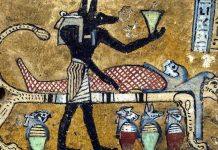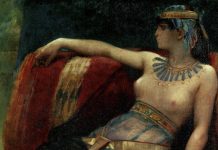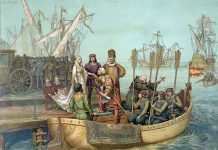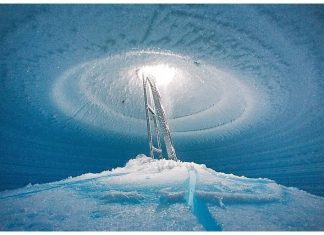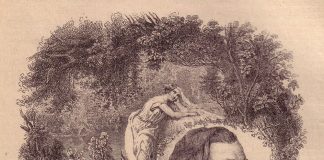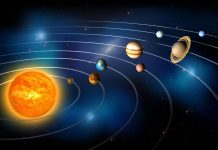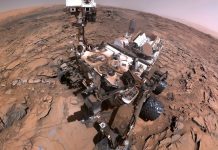One of the fun facts about Albert Einstein for kids is that he often worked on physics when he should have been examining patents at his day job. To Einstein’s credit, he continued his education, even while he worked! While working as a patent clerk, Albert Einstein continued to study physics and submit papers for publication. In 1905, Einstein would have the most incredible year of his life. His mind was moving so fast! There are almost too many Albert Einstein facts in 1905 alone to keep up with!
In 1905, Einstein published four important papers on physics. These were papers that would change physics forever, and alter the course of life in the 20th century. All his papers were published in the Annalen der Physik, a prestigious scientific journal.
Einstein’s first paper, on the photoelectric effect, would later earn him the Nobel Prize. His second paper, on Brownian motion described the movement of molecules.
The next two papers were so revolutionary, that it would be another 30 years or more until Einstein’s theories could be proven. Einstein’s paper on special relativity was the first big leap beyond Isaac Newton’s theories from almost 250 years earlier. Newton had his own miracle year or annus mirabilis, the Latin name often used to describe this phenomenon of events in a person’s life or in history. Newton’s miracle year was 1666, when he created breakthrough inventions and made important discoveries in calculus, motion, optics, and gravitation.
Two hundred and thirty nine years later, Einstein was blazing the path for modern physics that would take humankind beyond the classical worldview of Newtonian motion and gravity. This is one of the most important Albert Einstein facts. Einstein’s discoveries in physics are important because they changed the way we see the world and made a number of new discoveries and inventions possible. Einstein was only 26 years old and he was already altering the course of human history with only his mind, paper and pen!
Einstein’s fourth paper in 1905 is perhaps his most famous, as it contains his equation, E = mc2 . This is a revolutionary paper in nuclear physics that describes the behavior of matter as it approaches the speed of light. The amazing conclusion of this paper is that mass is equivalent to energy! This idea, even today, seems fantastic, but is one of the most important Albert Einstein facts that he established.
Many people consider E = mc2 to be the most famous equation ever. It was a monumental work that would change human life forever, as well as Einstein’s life. While his three other papers from 1905 would have been enough to establish Einstein as one of the greatest geniuses of all time, this fourth paper would make Einstein an international celebrity.
During the April of this same year, Einstein also received his PhD from the University of Zürich. His doctoral dissertation was A New Determination of Molecular Dimensions. It’s amazing to think that Albert Einstein accomplished all of this when he was only 26 years old! This is one of the Albert Einstein facts that is inspiring for kids and young adults.
Albert Einstein Read Euclid and Kant When He Was 10 Years Old
Albert Einstein facts about his youth teach us about a humble upbringing, with a big focus on education. Einstein was born in 1879 to a Jewish family living in Germany. His family was not observant, and Albert Einstein attended a Catholic school from the time he was five years old until he was eight. This is one of the interesting facts about Albert Einstein.
At eight years old, Einstein was transferred to the Luitpold Gymnasium, which has now been named after him. Einstein attended the school until he was fifteen years old. Some people have said that Einstein struggled as a student early on, or was a daydreamer. This is not one of our Albert Einstein facts as it’s not actually correct: Einstein excelled in his academic studies as a youth.
When Einstein was just 10 years old, he was introduced to the writings of philosopher Immanuel Kant, and the geometry of Euclid. These books made a big impression on the young Albert Einstein. One of the Albert Einstein facts is clear: even at a very young age he had a love of learning, and this was encouraged by his family.
Perhaps it was Kant’s Critique of Pure Reason that led Einstein to question the authority at his school. When he was 15 years old, Einstein’s family moved to Italy after his father’s business failed. Einstein was supposed to stay behind and finish his schooling. Instead, he used a doctor’s note as an excuse and traveled to Italy to rejoin his family. This is another one of the Albert Einstein facts that is fun for kids.
On a more serious note, Einstein later complained that the school’s teaching method was limiting his creativity and diminishing his love of learning. While in Italy, and only 15 or 16 years old, Einstein wrote a short essay entitled, On the Investigation of the State of Ether in a Magnetic Field. With an intellect as powerful as Albert Einstein’s, perhaps no school could satisfy the amount of information his young mind was capable of absorbing.
Albert Einstein Convinced FDR to Build the Atomic Bomb
One of the more surprising Albert Einstein facts is that Einstein was a pacifist, yet played a part in the building of the atomic bomb. Many people think that Einstein realized that his theories could be used to build a weapon, but this is not one of the Albert Einstein facts.
The truth is, before World War 2 began, Einstein was approached by European scientists who warned that Germany was developing an atomic weapon. This was the first time Einstein had conceived of the possibility of atomic weapons. He was a pacifist, so the thought of creating a weapon using his theories had never occurred to him.
Einstein contributed to a letter to President Roosevelt that suggested the United States begin atomic weapon research so they could build an atomic weapon before the Germans. Einstein even used his personal connections to get an audience with the President to convince him that the United States needed to win the race to build an atomic bomb.
The Manhattan Project was created to develop the atomic bomb, and the United States became the first country to develop an atomic weapon. Albert Einstein later regretted writing the letter and urging Roosevelt to pursue the creation of the atomic bomb. He later wrote another letter, along with British philosopher Bertrand Russell, advocating against the use of nuclear weapons.
While he was not directly involved in the creation of the atomic bomb, it would not have been possible without Einstein’s theories. This is one of the sad Albert Einstein facts that is also a sad fact about science and technology: too often humankind uses advances in science and technology for destructive purposes.
It Took 15 Years for Einstein’s Relativity Theory to Make Him Famous
When Eddington recorded the bending of light around the Sun, Albert Einstein’s hypothesis became established theory for most of the scientific community. There was proof that Einstein’s description of the Universe was better than Newton’s.
Einstein’s discovery was featured in headlines around world during the fall and winter of 1919. It’s one of our more remarkable Albert Einstein facts that his initial insights in 1905 would make him world famous 14 years later! Einstein had been refining and improving his hypotheses during this time, however, it was his miracle year of 1905 that laid the groundwork for his future work and much of modern physics.
In 1921, Einstein received the Nobel Prize for his work on the photoelectric effect. Despite the evidence, his theory of relativity was so advanced that the Nobel did not award him the prize for what may have been a more revolutionary insight.
Einstein toured the world and was given a hero’s welcome wherever he went. For the first time in modern history, someone had become famous by being incredibly smart! Einstein visited the United States, Japan, Singapore and Palestine, recording his observations of the different cultures he encountered in letters to friends and family.
Albert Einstein Failed His First Entrance Exam to College in 1895
In 1895, when Einstein was just 16 years old, he completed the entrance exams for the Swiss Federal Polytechnic in Zürich, Switzerland. He achieved good grades in the math and physics portions, but failed the general part of the exam. This is another one of the interesting facts about Albert Einstein, and tells us about one of the few times in his life he failed a test!
Einstein found another school in Aarau, Switzerland to finish the general studies that he needed for entrance into the Polytechnic. During this time, in 1896, Einstein renounced his German citizenship so that he would not have to serve in the military. Later in the year, Einstein graduated with the equivalent of his high school diploma.
Shortly afterwards, Einstein finally gained admittance to the Zürich Polytechnic. One of the inspiring Albert Einstein facts for kids is that Einstein wouldn’t take no for an answer. He finished the studies he needed for admittance to the Polytechnic within one year, and was only 17 years old when he started college!
Albert Einstein Was an Ordinary Patent Clerk When He Was 21
In 1900, Albert Einstein graduated from the Zürich Polytechnic with a teaching degree. During his time in college, Einstein excelled in his studies at school, and continued to study physics in his spare time. This is another one of the inspiring Albert Einstein facts: although he was in school, he continued to pursue the ideas that interested him.
After graduation, Einstein searched in vain for a teaching position. He became a Swiss citizen in 1901, but he avoided being drafted into the military by citing medical reasons. It’s not clear to us today what these medical reasons were, or whether this was another example of Einstein using a doctor’s note as an excuse! This might be another one of the fun facts about Albert Einstein, or his actions could have been due to his philosophy of pacifism.
When he was unable to find work teaching, Einstein landed a job as an assistant patent examiner. Einstein worked as an ordinary patent clerk. While this may seem like one of the more discouraging Albert Einstein facts, it is reported that this position gave Einstein plenty of free time during the day to contemplate the physics questions that occupied his mind.
He was given a permanent post in 1903, so Einstein must have been doing a sufficient job. He was passed over for promotion though, which leads us to believe he may have spent some of his time on the job working on the physics problems that interested him!
Albert Einstein Made His Breakthrough Discoveries in Relative Isolation
In 1905, Einstein was largely unknown and was working in relative isolation. While Einstein had access to the Annalen der Physik, he was not a part of any prestigious academic circles during his time as a patent clerk.
Perhaps this was for the best. Einstein had disdained the overly rigorous approach to education at his school as a youth. Remaining largely outside the confines of academia gave Albert Einstein the freedom he needed to let his mind race in whatever direction pleased him.
One of the Albert Einstein facts we know is that he was not completely alone. Einstein regularly met with a group of friends to discuss physics and philosophy. Einstein also bounced many of his ideas off of a colleague that he knew from the Zürich Polytechnic and worked with at the Swiss patent office, Michele Besso. Einstein also discussed his work with his wife at the time, Mileva Marić.
However, there is no clear evidence that any of these people contributed significantly to Albert Einstein’s breakthrough papers. Albert Einstein was a singular genius. Pursuing his own self-study, he was able to surpass the physics being taught at the time by leaps and bounds. This is another of the inspiring Albert Einstein facts that tells us to let our passion for learning guide us in our quest for knowledge.
In 3 Years Albert Einstein Went from Obscurity to Celebrity
In 1903, Albert Einstein still could not find a teaching job. Finally, in 1908, after the publication of his papers from his miracle year in 1905, he was appointed as a lecturer at the University of Bern. It took three years for even the brilliant academics at the time to realize the monumental nature of Einstein’s work!
In 1909, Einstein received a professorship at the University of Zürich. He briefly taught as a professor in Prague in 1911, before returning to the Zürich Polytechnic where he became professor of theoretical physics. Einstein returned to Germany in 1914 and was appointed as the director of the Kaiser Wilhem Institute for Physics, a post he would hold until 1932. It’s one of the ironic Albert Einstein facts that he could hardly find a teaching job after receiving his degree, but was now receiving offers and appointments from universities all across Europe!
Einstein’s Relativity Theory Was Proved in 1919 During a Solar Eclipse
It’s important to remember another one of the Albert Einstein facts: Einstein was a theoretical physicist. Einstein was not an engineer who designed inventions, or someone who made practical discoveries that could be put to immediate use. Albert Einstein proposed hypotheses or descriptions of how the Universe operates. In science, a hypothesis becomes a theory when there is significant evidence to show that the proposed way of describing the Universe more closely matches the observed evidence than any previous theories.
In this way, scientific theories gradually improve our understanding of the Universe through better and better descriptions and models. Einstein’s descriptions were a complete revolution over the Newtonian theories proven at the time. For theoretical physicists, it is vital to find an experiment that will prove a hypothesis is better than a previous theory. For Einstein, finding an experiment was difficult, because his hypotheses were so far ahead of current physics and instrumentation that could measure the physical world.
In 1911, Albert Einstein discovered a way to prove his hypothesis of relativity. According the theory of relativity he had developed at the time, the light from a distant star should be bent by the Earth’s gravity. At the time, telescopes were only powerful enough to detect this event during a solar eclipse.
A race was on among experimental physicists. These are the physicists who create instruments and experiments that prove the hypotheses of theoretical physicists. A solar eclipse only occurs every so often, and is only a total eclipse in certain parts of the world. Experimental physicists traveled to the tropics and other destinations around the world, hoping to prove Einstein’s theory right. Bear in mind, they would not only have to be in the right place at the right time, but the experimental physicists would need enough time with no clouds overhead to measure the light from the distant star before, during and after the solar eclipse.
When we consider this, it’s not one of the surprising Albert Einstein facts that it wasn’t until May of 1919 that Sir Arthur Stanley Eddington finally proved Einstein’s theory of relativity. Eddington also played an important role in translating and spreading Einstein’s theory of relativity to the English-speaking world. One of the Albert Einstein facts we tend to forget is that he spoke German, and his original papers were published in German. Without the help of international scientists like Eddington, Einstein’s ideas may have only been circulated throughout Germany or Europe.
Albert Einstein Wasn’t a United States Citizen Until 1940
Albert Einstein was visiting the United States in 1933 when Adolf Hitler took power of Germany and started a series of actions against Jews that would become the Holocaust. Einstein was Jewish and possessed enough common sense in addition to his incredible intellect to stay in the United States and take up residence.
Einstein was so famous that, on his return trip to the United States, which started in 1930, people working on his behalf limited public access to him. This was necessary so that he could focus on his work, and on meeting important intellectuals and luminaries in the United States.
The laws enacted in Germany by Hitler and the Nazi party prevented any Jewish person from holding a professor post at a university. Einstein helped other Jewish intellectuals avoid persecution by using his fame to convince world leaders to provide opportunities for emigration.





